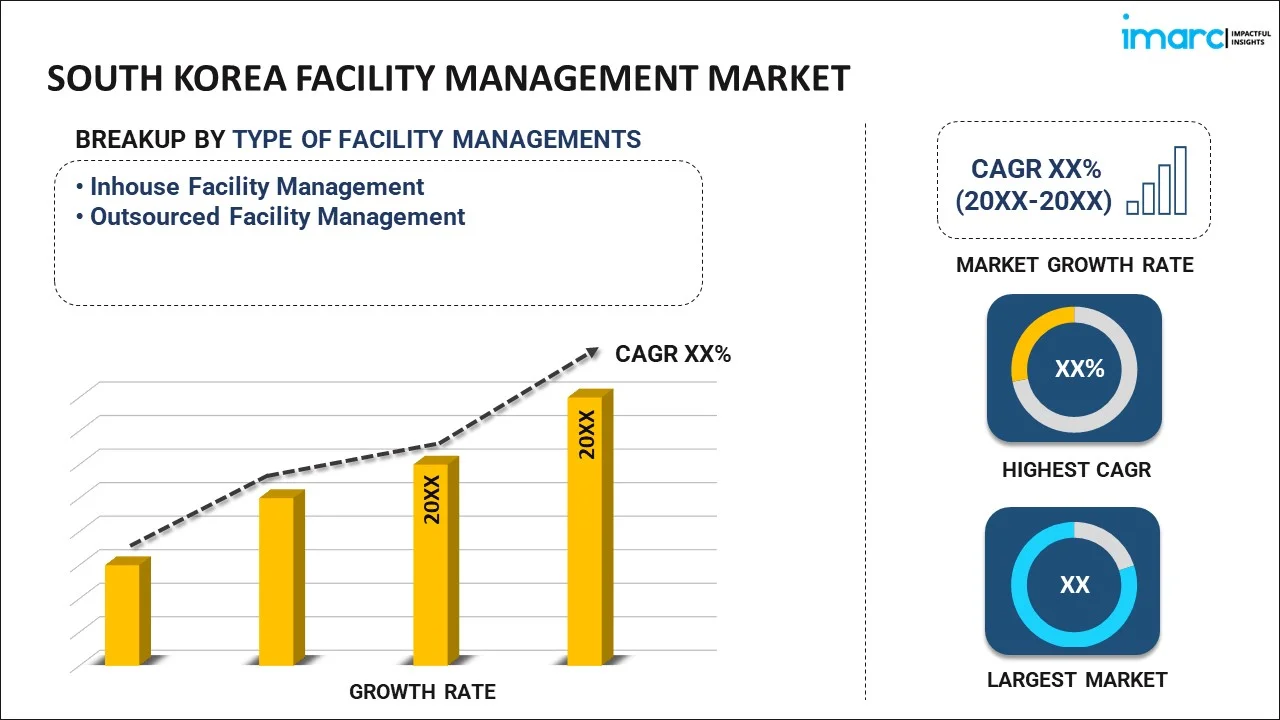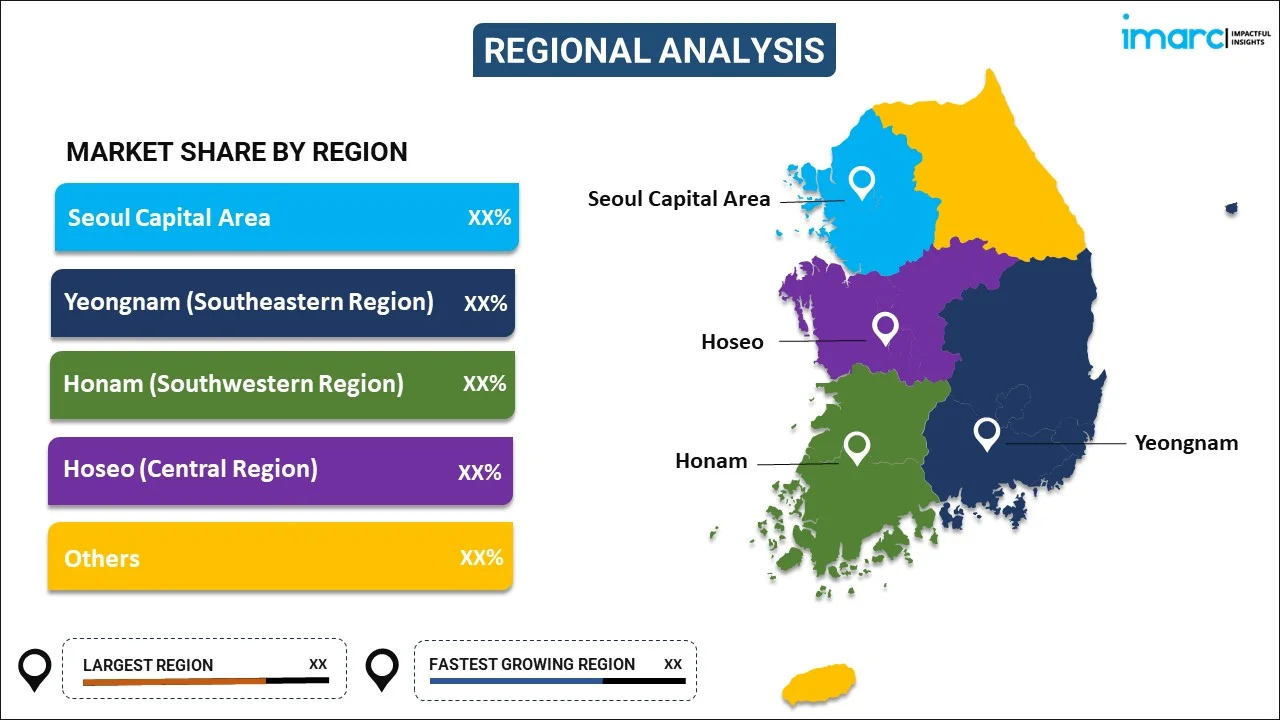
South Korea Facility Management Market Report by Type of Facility Management (Inhouse Facility Management, Outsourced Facility Management), Offering (Hard FM, Soft FM), End User (Commercial, Institutional, Public/Infrastructure, Industrial, and Others), and Region 2025-2033
Market Overview:
The South Korea facility management market size reached USD 1.5 Billion in 2024. Looking forward, IMARC Group expects the market to reach USD 4.0 Billion by 2033, exhibiting a growth rate (CAGR) of 10.2% during 2025-2033. The rapid urbanization and industrialization in the country, the integration of artificial intelligence (AI) and the Internet of Things (IoT), increasing complexity of modern workspaces, and the implementation of various government initiatives represent some of the key factors driving the market.
|
Report Attribute
|
Key Statistics
|
|---|---|
|
Base Year
|
2024 |
|
Forecast Years
|
2025-2033
|
|
Historical Years
|
2019-2024
|
| Market Size in 2024 | USD 1.5 Billion |
| Market Forecast in 2033 | USD 4.0 Billion |
| Market Growth Rate (2025-2033) | 10.2% |
Facility management (FM) refers to a multidisciplinary field that encompasses the planning, coordination, and execution of various services to ensure the optimal functioning of an organization's built environment. It integrates people, processes, technology, and physical assets to maximize efficiency and achieve organizational goals. Facility management services include various types, such as property management, maintenance, janitorial services, security, environmental health, and utilities management, among others. They employ various software, such as building information modeling (BIM), computer-aided facility management (CAFM), and various monitoring and control systems. Facility management finds applications in commercial buildings, hospitals, educational institutions, retail spaces, manufacturing units, and government establishments. They offer numerous benefits, including cost savings, increased employee productivity, compliance with regulations, enhanced sustainability, and improved asset lifespan. Furthermore, facility management ensures operational continuity, elevates the quality of the work environment, provides strategic insights through data analytics, mitigates risk, enhances customer experience, enables flexible work arrangements, fosters innovation, allows for proactive maintenance, and streamlines resource allocation.
South Korea Facility Management Market Trends:
The rapid urbanization and industrialization in the country, leading to an increased number of buildings and facilities that require effective management, is one of the major factors contributing to the market growth. In line with this, the growing demand for advanced facility management services, especially those that leverage smart technology for real-time monitoring and maintenance, is creating a positive outlook for the market. Along with this, the rising awareness about sustainability and eco-friendly practices, prompting businesses and organizations to adopt facility management services that align with green building standards, is supporting the market growth. Moreover, the integration of artificial intelligence (AI) and the Internet of Things (IoT) in facility management, offering improved operational efficiency, predictive analytics, and remote monitoring capabilities, is providing an impetus to the market growth. Along with this, the introduction of stringent government regulations and standards for workplace safety and environmental conservation, making it imperative for companies to invest in professional facility management services, is anticipated to drive the market growth. Additionally, the increasing complexity of modern workspaces, replete with advanced technologies and diverse employee needs, compelling companies to opt for integrated facility management services that can handle multifaceted challenges effectively, is bolstering the market growth. In confluence with this, the rising demand for specialized services such as disaster recovery planning, energy management, and space optimization, reflecting the evolving needs of businesses, is fostering the market growth. Furthermore, the implementation of various government initiatives, providing a favorable environment for the expansion of facility management services that are tailored to the specialized needs of sectors like healthcare, education, and manufacturing, is favoring the market growth.
South Korea Facility Management Market Segmentation:
IMARC Group provides an analysis of the key trends in each segment of the market, along with forecasts at the country level for 2025-2033. Our report has categorized the market based on type of facility management, offering, and end user.
Type of Facility Management Insights:

- Inhouse Facility Management
- Outsourced Facility Management
- Single FM
- Bundled FM
- Integrated FM
The report has provided a detailed breakup and analysis of the market based on the type of facility management. This includes inhouse facility management and outsourced facility management (single FM, bundled FM, and integrated FM).
Offering Insights:
- Hard FM
- Soft FM
A detailed breakup and analysis of the market based on the offering have also been provided in the report. This includes hard FM and soft FM.
End User Insights:
- Commercial
- Institutional
- Public/Infrastructure
- Industrial
- Others
The report has provided a detailed breakup and analysis of the market based on the end user. This includes commercial, institutional, public/infrastructure, industrial, and others.
Regional Insights:

- Seoul Capital Area
- Yeongnam (Southeastern Region)
- Honam (Southwestern Region)
- Hoseo (Central Region)
- Others
The report has also provided a comprehensive analysis of all the major regional markets, which include Seoul Capital Area, Yeongnam (Southeastern Region), Honam (Southwestern Region), Hoseo (Central Region), and Others.
Competitive Landscape:
The market research report has also provided a comprehensive analysis of the competitive landscape in the market. Competitive analysis such as market structure, key player positioning, top winning strategies, competitive dashboard, and company evaluation quadrant has been covered in the report. Also, detailed profiles of all major companies have been provided.
South Korea Facility Management Market Report Coverage:
| Report Features | Details |
|---|---|
| Base Year of the Analysis | 2024 |
| Historical Period | 2019-2024 |
| Forecast Period | 2025-2033 |
| Units | Billion USD |
| Scope of the Report | Exploration of Historical and Forecast Trends, Industry Catalysts and Challenges, Segment-Wise Historical and Predictive Market Assessment:
|
| Type of Facility Managements Covered |
|
| Offerings Covered | Hard FM, Soft FM |
| End Users Covered | Commercial, Institutional, Public/Infrastructure, Industrial, Others |
| Regions Covered | Seoul Capital Area, Yeongnam (Southeastern Region), Honam (Southwestern Region), Hoseo (Central Region), Others |
| Customization Scope | 10% Free Customization |
| Post-Sale Analyst Support | 10-12 Weeks |
| Delivery Format | PDF and Excel through Email (We can also provide the editable version of the report in PPT/Word format on special request) |
Key Questions Answered in This Report:
- How has the South Korea facility management market performed so far and how will it perform in the coming years?
- What has been the impact of COVID-19 on the South Korea facility management market?
- What is the breakup of the South Korea facility management market on the basis of type of facility management?
- What is the breakup of the South Korea facility management market on the basis of offering?
- What is the breakup of the South Korea facility management market on the basis of end user?
- What are the various stages in the value chain of the South Korea facility management market?
- What are the key driving factors and challenges in the South Korea facility management?
- What is the structure of the South Korea facility management market and who are the key players?
- What is the degree of competition in the South Korea facility management market?
Key Benefits for Stakeholders:
- IMARC’s industry report offers a comprehensive quantitative analysis of various market segments, historical and current market trends, market forecasts, and dynamics of the South Korea facility management market from 2019-2033.
- The research report provides the latest information on the market drivers, challenges, and opportunities in the South Korea facility management market.
- Porter's five forces analysis assist stakeholders in assessing the impact of new entrants, competitive rivalry, supplier power, buyer power, and the threat of substitution. It helps stakeholders to analyze the level of competition within the South Korea facility management industry and its attractiveness.
- Competitive landscape allows stakeholders to understand their competitive environment and provides an insight into the current positions of key players in the market.
Need more help?
- Speak to our experienced analysts for insights on the current market scenarios.
- Include additional segments and countries to customize the report as per your requirement.
- Gain an unparalleled competitive advantage in your domain by understanding how to utilize the report and positively impacting your operations and revenue.
- For further assistance, please connect with our analysts.
 Request Customization
Request Customization
 Speak to an Analyst
Speak to an Analyst
 Request Brochure
Request Brochure
 Inquire Before Buying
Inquire Before Buying




.webp)




.webp)












